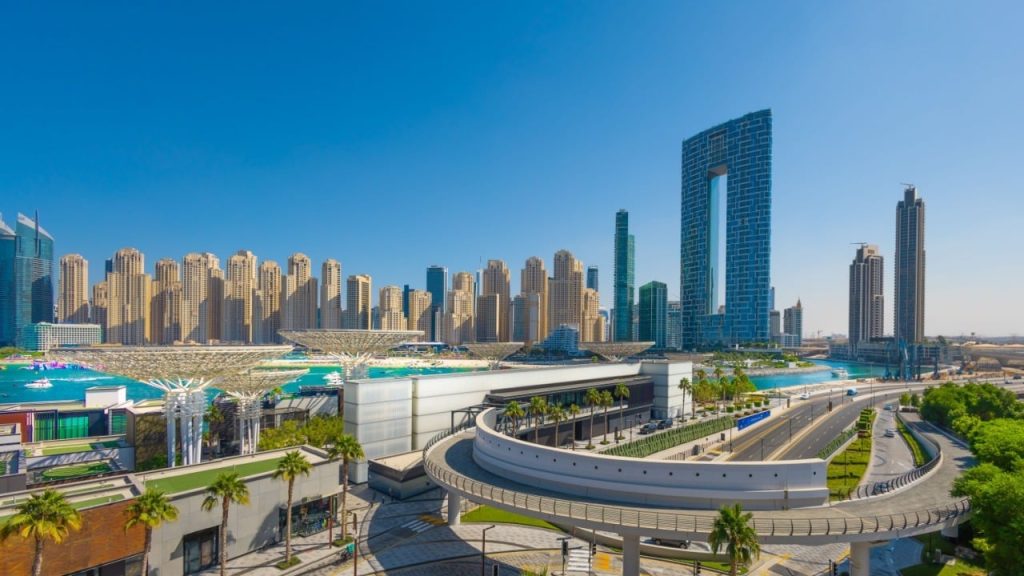
The Middle East and North Africa (MENA) region is rapidly emerging as a significant player in the global cryptocurrency landscape. With increasing institutional interest and a favorable regulatory environment in certain areas, the region presents a lucrative opportunity for companies in the decentralized finance (DeFi) sector. Nasdaq-listed DeFi Technologies Inc. has recognized this potential and is strategically expanding its presence in the Gulf Cooperation Council (GCC) and MENA regions, particularly through establishing a new office in Dubai, UAE. This move marks a significant step for the company and underscores the growing importance of the Middle East in the future of digital finance.
The Allure of the MENA Crypto Market
Several factors contribute to the appeal of the MENA region for crypto and DeFi companies:
Rising Institutional Demand
Institutional investors in the Middle East are increasingly interested in digital assets. This trend is evident in the growing inflows into Bitcoin and Ethereum exchange-traded funds (ETFs). For instance, the UAE sovereign wealth fund Mubadala has expanded its position in BlackRock’s Bitcoin ETF, indicating a growing acceptance and adoption of crypto assets at the institutional level. This institutional interest is not limited to sovereign wealth funds. Private investment firms and family offices in the region are also exploring crypto investments, driven by the potential for high returns and portfolio diversification.
Favorable Regulatory Environment
Some countries in the MENA region, particularly the UAE, are proactively creating regulatory frameworks to support the growth of the crypto industry. Dubai, in particular, aims to become a global blockchain and fintech hub, offering a welcoming environment for companies in this space. This regulatory clarity provides a level of certainty that encourages investment and innovation. The UAE’s Virtual Assets Regulatory Authority (VARA) has been instrumental in establishing clear guidelines for crypto businesses, ensuring compliance and fostering a secure environment for digital asset transactions.
High Consumer Engagement
Countries like Turkey have seen significant market maturation in the crypto space, driven by stablecoins and high consumer engagement. This widespread adoption provides a solid foundation for further growth and development in the DeFi sector. In Turkey, the use of cryptocurrencies has surged due to economic instability and high inflation rates, making digital assets an attractive alternative to traditional fiat currencies. This consumer engagement is not limited to Turkey; other countries in the region, such as Saudi Arabia and the UAE, are also witnessing a growing interest in crypto assets among retail investors.
Strategic Location
Dubai’s location makes it a strategic hub for accessing markets across the Middle East, Africa, and Asia. This access is crucial for companies looking to expand their reach and tap into new customer bases. Dubai’s well-developed infrastructure, including its world-class airports and seaports, facilitates easy access to global markets. Additionally, the city’s time zone aligns with major financial centers in Europe and Asia, making it an ideal location for conducting business across different time zones.
DeFi Technologies’ Strategic Move: A Closer Look
DeFi Technologies Inc.’s expansion into the MENA region involves several key elements:
Registration of DEFI DMCC
The company has registered DEFI DMCC with offices in Jumeirah Lake Towers, Dubai. This establishes a formal presence in the region, allowing DeFi Technologies to conduct business and offer its services to local clients. The registration process in Dubai is streamlined and efficient, making it easier for companies to set up operations quickly. This formal presence also enhances the company’s credibility and trustworthiness in the eyes of local investors and regulators.
Targeting Institutional Capital
DeFi Technologies aims to capitalize on the growing institutional appetite for crypto-wrapped regulated financial instruments. This includes offering digital asset exchange-traded products (ETPs) through its subsidiary, Valour, which provides access to 65 different digital assets. These ETPs offer institutional investors a regulated and secure way to gain exposure to digital assets without the complexities of direct ownership. By targeting institutional capital, DeFi Technologies can tap into a significant source of funding and drive the growth of its products and services.
Bridging Traditional Finance and DeFi
DeFi Technologies positions itself as a bridge between traditional capital markets and decentralized finance. This approach is likely to resonate with institutional investors in the MENA region who are familiar with traditional finance but are also keen to explore the opportunities presented by DeFi. By offering products that combine the best of both worlds, DeFi Technologies can attract a broader range of investors and facilitate the integration of DeFi into the mainstream financial system.
Supporting Spot Bitcoin and Ethereum ETFs
The move comes amid growing global interest in spot Bitcoin and Ethereum ETFs, with the UAE emerging as a key market for institutional crypto investment. DeFi Technologies’ presence in the region will facilitate access to these investment products for local investors. Spot ETFs provide investors with direct exposure to the underlying assets, making them an attractive option for those looking to invest in cryptocurrencies without the need for complex trading strategies. The UAE’s regulatory framework supports the launch and trading of these ETFs, providing a secure and transparent environment for investors.
The Role of Dubai in the Crypto Ecosystem
Dubai’s ambition to become a global crypto hub is supported by several factors:
Proactive Regulatory Environment
The establishment of a digital assets regulator and the implementation of clear regulations are attracting crypto companies to Dubai. This regulatory clarity provides a stable and predictable environment for businesses to operate. The UAE’s Virtual Assets Regulatory Authority (VARA) has been instrumental in establishing clear guidelines for crypto businesses, ensuring compliance and fostering a secure environment for digital asset transactions. This proactive approach to regulation has positioned Dubai as a leading destination for crypto companies looking to expand their operations.
Tax Incentives
Dubai does not levy income taxes, making it an attractive location for companies and individuals in the crypto space. This tax advantage can significantly reduce the cost of doing business and increase profitability. The absence of income taxes allows companies to reinvest their earnings into growth and innovation, making Dubai an ideal location for startups and established businesses alike. Additionally, the UAE’s free zones offer further tax benefits and streamlined business setup processes, making it easier for companies to establish a presence in the region.
Thriving Ecosystem
Dubai has developed a thriving ecosystem for crypto and blockchain companies, with various free zones and regulatory hubs teeming with activity. This ecosystem provides access to talent, resources, and networking opportunities. The Dubai International Financial Centre (DIFC) and the Dubai Multi Commodities Centre (DMCC) are among the key hubs that support the growth of the crypto industry. These free zones offer a range of services, including business setup, licensing, and regulatory support, making it easier for companies to establish and grow their operations in Dubai.
Potential Impacts and Future Prospects
DeFi Technologies’ expansion into the MENA region has several potential implications:
Increased Accessibility to Regulated Products
The presence of DeFi Technologies in the UAE will increase accessibility to regulated crypto products, such as Bitcoin and Ethereum ETFs, for investors in the region. These regulated products provide investors with a secure and transparent way to gain exposure to digital assets, reducing the risks associated with direct ownership. By increasing accessibility to these products, DeFi Technologies can help to drive the adoption of crypto assets among institutional and retail investors in the region.
Driving Adoption of DeFi
By bridging the gap between traditional finance and DeFi, the company can help to accelerate the adoption of DeFi technologies and applications in the Middle East. DeFi offers a range of benefits, including lower costs, faster transactions, and greater transparency. By offering products that combine the best of both worlds, DeFi Technologies can attract a broader range of investors and facilitate the integration of DeFi into the mainstream financial system.
Economic Growth
The expansion of the crypto industry in the MENA region will contribute to economic growth, creating jobs and attracting investment. The crypto industry has the potential to create a wide range of job opportunities, from software development and marketing to compliance and customer support. Additionally, the influx of investment into the region can drive economic growth and development, creating a positive feedback loop that benefits the entire ecosystem.
Competition and Innovation
DeFi Technologies’ entry into the market will likely spur competition and innovation among crypto companies in the region, leading to better products and services for consumers. Competition drives innovation, and the presence of multiple players in the market can lead to the development of new products and services that cater to the unique needs of investors in the region. This competitive environment can also lead to lower costs and better customer service, benefiting consumers and driving the growth of the industry.
The Competitive Landscape
While the MENA region presents significant opportunities, it’s also becoming increasingly competitive. Other major players, such as Binance, are also establishing a strong presence in the region. This competition underscores the importance of having a clear strategy and a strong value proposition to succeed in the MENA crypto market. Binance, for example, has established a significant presence in the UAE through its partnership with the Dubai World Trade Centre Authority. This partnership allows Binance to operate a regulated crypto exchange in Dubai, providing a secure and transparent environment for investors. To compete effectively, DeFi Technologies must differentiate itself by offering unique products and services that cater to the specific needs of investors in the region.
Conclusion
DeFi Technologies’ strategic expansion into the MENA region, with a focus on Dubai, represents a bold step towards integrating decentralized finance into the global financial system. By capitalizing on the region’s growing institutional interest, favorable regulatory environment, and strategic location, the company is well-positioned to contribute to the growth of the crypto industry in the Middle East and beyond. This move not only benefits DeFi Technologies but also strengthens Dubai’s position as a leading hub for blockchain and fintech innovation, paving the way for a future where traditional and decentralized finance converge to create a more accessible and efficient financial ecosystem. The company’s focus on bridging the gap between traditional finance and DeFi, along with its commitment to offering regulated products, positions it as a key player in the region’s crypto landscape. As the industry continues to evolve, DeFi Technologies’ presence in the MENA region will play a crucial role in driving the adoption of DeFi technologies and shaping the future of digital finance.





